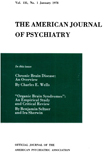Alcohol and Affect: A Psychopharmacological Study
Abstract
To investigate the influence of alcohol upon affective state, an intoxicating dose was administered intravenously to three groups—alcoholic patients, severely depressed patients, and control subjects. Using the Clyde Mood Scale to measure each subject's affect before and after alcohol infusion, the authors found that alcohol does alter affect, primarily in a palliative rather than euphoriant way. The alcoholics derived the least benefit from alcohol intoxication in terms of affective improvement, while the depressed patients improved dramatically.
Access content
To read the fulltext, please use one of the options below to sign in or purchase access.- Personal login
- Institutional Login
- Sign in via OpenAthens
- Register for access
-
Please login/register if you wish to pair your device and check access availability.
Not a subscriber?
PsychiatryOnline subscription options offer access to the DSM-5 library, books, journals, CME, and patient resources. This all-in-one virtual library provides psychiatrists and mental health professionals with key resources for diagnosis, treatment, research, and professional development.
Need more help? PsychiatryOnline Customer Service may be reached by emailing [email protected] or by calling 800-368-5777 (in the U.S.) or 703-907-7322 (outside the U.S.).



